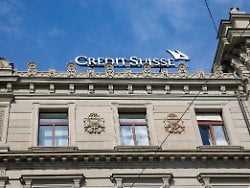Suisse Secrets
Swiss bank courted criminal customers
02/20/2022, 7:11 p.m
Autocrats, human traffickers and dealers have been among the customers of the second largest Swiss bank Credit Suisse for years, as a data analysis by several media shows. An anonymous source had provided the information on this. According to her, banking secrecy is a “fig leaf” for collaborators.
Switzerland’s second largest bank, Credit Suisse, has for many years accepted corrupt autocrats, suspected war criminals, human traffickers, drug dealers and other criminals as clients. This is borne out by data from the financial institution, which was passed to the “Süddeutsche Zeitung” by an anonymous source and evaluated together with NDR, WDR and several international media partners – including the “Guardian”, “Le Monde” and the “New York Times”. The filings reveal the accounts of more than 30,000 customers around the world and suggest the bank’s failure to screen many customers. Credit Suisse rejects the allegations. A large part of the accounts had also long been closed.
According to the Suisse Secrets data, criminals could open accounts with Credit Suisse or keep their accounts even if the bank should have known long ago that they were dealing with criminals. Banks must carefully screen customers, especially heads of state or government, ministers, secret service agents or entrepreneurs with questionable business practices. If they notice assets of unknown origin that stem from or could serve as a criminal offense, they must report suspected money laundering.
The Suisse Secrets data range from the 1940s to well into the past decade, more than two thirds of the available accounts were opened after the year 2000, and quite a few of them exist according to research by SZ, NDR and WDR to this day. The data includes a human trafficker convicted in the Philippines and an Egyptian murderer, as well as cardinals allegedly involved in shady dealings and a former Siemens manager convicted of bribery in 2008.
Amounts of money that cannot be explained by salary
The former Nigerian boss of the Munich global company had six accounts with Credit Suisse at times. According to data from 2006, one of them has assets worth more than 54 million Swiss francs – a sum that cannot be explained by his Siemens salary. When asked, the ex-manager denied wrongdoing without explaining where the millions came from.
Credit Suisse declined to answer specific questions about the case or the other accounts in question, but said it adhered to the “highest standards of conduct”: “In conducting its business, Credit Suisse complies with applicable global and local laws and regulations.”
According to internal bank data, numerous heads of state and government, ministers and heads of intelligence services, as well as oligarchs and cardinals, were clients of Credit Suisse. Among others, the Jordanian King Abdullah II, the former Iraqi Deputy Prime Minister Ayad Allawi, the Algerian autocrat Abdelaziz Bouteflika and the Armenian ex-President Armen Sarkissyan appear in the documents. Sarkissian resigned as president in January, shortly after the Süddeutsche Zeitung, NDR and WDR sent him an inquiry about his accounts at Credit Suisse. The politician said he had closed all accounts before he was required to declare his assets – a national anti-corruption agency is now dealing with it.
Swiss media not involved
The “Süddeutsche Zeitung” evaluated the Credit Suisse data together with the Organized Crime and Corruption Reporting Project (OCCRP) and 46 media partners from all over the world. The results are published under the title “Suisse Secrets”. In response to a request, Credit Suisse spoke of a “concerted action with the intention of strengthening the Swiss financial center […] to bring into disrepute”.
No medium from Switzerland took part in the research, since the local banking law could make it possible to prosecute journalists for researching leaked bank data. Critics see this as a massive restriction of press freedom.
“I believe Swiss banking secrecy is immoral”
Switzerland is considered one of the most opaque financial centers in the world. Any disclosure of account information is punishable by law. Although banking secrecy has been relaxed in recent years, as Switzerland exchanges information about account holders with a number of countries, it has not with some of the poorest and most corrupt countries.
“I believe that Swiss banking secrecy is immoral,” the source of the Suisse Secrets data, unknown to SZ and its research partners, said in a statement. “The pretense of protecting financial privacy is just a fig leaf to cover up the shameful role of Swiss banks as collaborators with tax evaders.”
